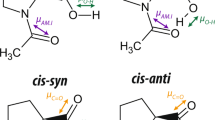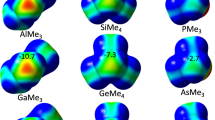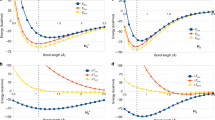Abstract
THE substitution of deuterium for hydrogen has a characteristic effect on the bond lengths in hydrogen compounds, depending on the type of linkage involved. The effect has been described for ionic and covalent linkages1. In the case of structures involving intermolecular hydrogen bonds, no theoretical prediction of the effect could be made, because the nature of the hydrogen bond is not fully understood.
This is a preview of subscription content, access via your institution
Access options
Subscribe to this journal
Receive 51 print issues and online access
$199.00 per year
only $3.90 per issue
Buy this article
- Purchase on Springer Link
- Instant access to full article PDF
Prices may be subject to local taxes which are calculated during checkout
Similar content being viewed by others
References
Ubbelohde, A. R., Trans. Far. Soc., 32, 525 (1936).
Robertson, J. M., and Woodward, I., J. Chem. Soc., 1817 (1936).
Halford, J., and Anderson, L., J. Amer. Chem. Soc., 58, 736 (1936).
Zintl, E., and Harder, A., Z. phys. Chem., 28B 478 (1935).
Ubbelohde, A. R., Proc. Roy. Soc., A, (1937), in the press.
Sidgwick, N., Ann. Rep. Chem. Soc., 31, 38 (1934).
Megaw, A., NATURE, 134, 900 (1934).
Author information
Authors and Affiliations
Rights and permissions
About this article
Cite this article
ROBERTSON, J., UBBELOHDE, A. Isotope Effect in Hydrogen and Hydroxyl Bonds. Nature 139, 504–505 (1937). https://doi.org/10.1038/139504a0
Issue Date:
DOI: https://doi.org/10.1038/139504a0
This article is cited by
-
Structure of Organic Molecular Compounds
Nature (1937)
Comments
By submitting a comment you agree to abide by our Terms and Community Guidelines. If you find something abusive or that does not comply with our terms or guidelines please flag it as inappropriate.



